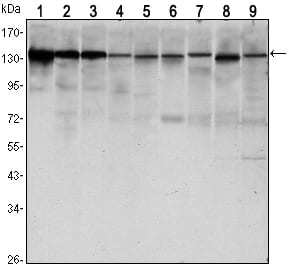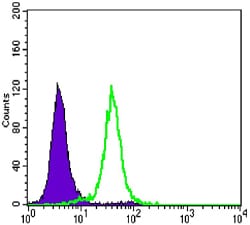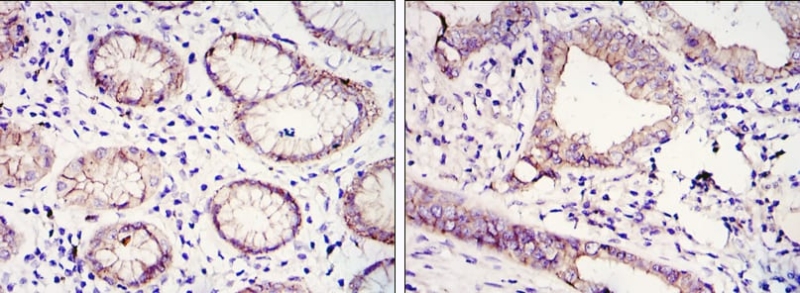


| WB | 咨询技术 | Human,Mouse,Rat |
| IF | 咨询技术 | Human,Mouse,Rat |
| IHC | 1/25-1/100 | Human,Mouse,Rat |
| ICC | 技术咨询 | Human,Mouse,Rat |
| FCM | 咨询技术 | Human,Mouse,Rat |
| Elisa | 1/5000-1/10000 | Human,Mouse,Rat |
| Aliases | UVO; CDHE; ECAD; LCAM; Arc-1; CD324; CDH1;E-cadherin;E cadherin |
| Entrez GeneID | 999 |
| clone | 7H12 |
| WB Predicted band size | 135kDa |
| Host/Isotype | Mouse IgG1 |
| Antibody Type | Primary antibody |
| Storage | Store at 4°C short term. Aliquot and store at -20°C long term. Avoid freeze/thaw cycles. |
| Species Reactivity | Human,Mouse,Monkey |
| Immunogen | Purified recombinant fragment of human CDH1 expressed in E. Coli. |
| Formulation | Purified antibody in PBS with 0.05% sodium azide. |
+ +
以下是关于CNTN1抗体的3篇参考文献及其摘要内容:
---
1. **文献名称**: *Contactin-1 autoantibodies in patients with autoimmune encephalitis: clinical correlates and diagnostic implications*
**作者**: Miske R, et al.
**摘要**: 该研究报道了在部分自身免疫性脑炎患者血清中检测到CNTN1抗体,发现其与认知功能障碍、小脑共济失调及周围神经病变相关,提示CNTN1抗体可能通过干扰神经元黏附导致神经传导异常。
2. **文献名称**: *Chronic inflammatory demyelinating polyneuropathy with autoantibodies against contactin-1: a distinct clinical phenotype*
**作者**: van der Veen S, et al.
**摘要**: 研究者发现CNTN1抗体阳性的慢性炎症性脱髓鞘性神经病(CIDP)患者表现为远端对称性运动障碍和感觉缺失,对静脉免疫球蛋白治疗反应较差,提示CNTN1抗体可能是CIDP亚型分层的生物标志物。
3. **文献名称**: *Contactin-1 antibodies induce paranodal dissection in experimental autoimmune models*
**作者**: Pascual-Goñi A, et al.
**摘要**: 通过动物模型证实,CNTN1抗体可靶向结合周围神经的结旁区域,导致髓鞘结构破坏和神经传导阻滞,为抗体介导的神经损伤机制提供了直接证据。
---
如需更多文献,可进一步检索PubMed或Google Scholar,关键词包括“CNTN1 antibody”或“Contactin-1 autoimmunity”。部分研究可能聚焦于抗体检测方法或与特定疾病(如副肿瘤综合征)的关联。
The CNTN1 antibody targets Contactin-1 (CNTN1), a cell adhesion molecule belonging to the immunoglobulin superfamily. CNTN1 is predominantly expressed in the nervous system, where it plays critical roles in axon guidance, myelination, and synaptic plasticity. It interacts with proteins like contactin-associated protein 1 (Caspr1) to form membrane complexes essential for neuron-glia communication and node of Ranvier organization.
Autoantibodies against CNTN1 are implicated in autoimmune neurological disorders. They are strongly associated with chronic inflammatory demyelinating polyneuropathy (CIDP), particularly in subsets of patients with aggressive, treatment-resistant phenotypes. These antibodies disrupt CNTN1-Caspr1 interactions, impairing paranodal junction integrity and leading to nerve conduction abnormalities. CNTN1 antibodies are also linked to paraneoplastic neurological syndromes, often coexisting with malignancies like lymphomas or solid tumors.
Clinically, detection of CNTN1 antibodies (via serum or CSF testing) aids in diagnosing autoimmune neuropathies and guiding treatment. Patients with CNTN1 autoimmunity may exhibit poor response to intravenous immunoglobulin (IVIg) but show improvement with B-cell-targeted therapies like rituximab. Research continues to explore CNTN1’s broader role in neuroinflammation and its potential as a biomarker for disease stratification. Understanding CNTN1 antibody mechanisms offers insights into neuroglial dysfunction and novel therapeutic strategies for autoimmune neurological conditions.
×